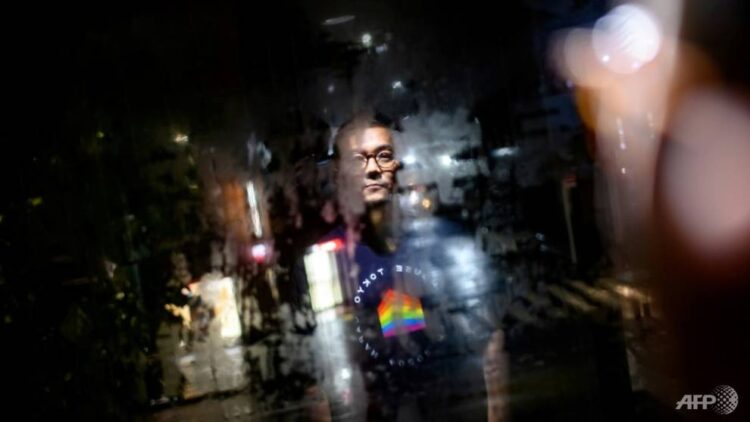[ad_1]
TOKYO: Tokyo on Sunday (Oct 11) opened its first main group hub for LGBTQ individuals this month, a part of a pre-Olympics challenge that campaigners hope will deal with stigma and lift consciousness of discrimination.
Pleasure Home Tokyo is predicated on comparable inclusive pop-up websites arrange at previous Olympics, however will supply a everlasting assembly house and knowledge centre, in search of to teach the general public about sexual variety and supply refuge to these struggling harassment or discrimination.
Whereas Japan has some protections for sexual minorities, it stays the one G7 nation that doesn’t recognise same-sex unions, and lots of couples say they will battle to hire residences collectively and are even barred from hospital visits.
READ: Japan Airlines embraces gender neutral greetings
These challenges imply areas like Pleasure Home, arrange in coordination with Tokyo 2020 Olympic organisers, are sorely wanted in Japan, activists say.
“Japan, not simply in sporting circles however society as a complete – together with colleges and workplaces – just isn’t pleasant to LGBTQ individuals, and it’s laborious to come back out,” Gon Matsunaka, who heads the challenge behind Pleasure Home, advised AFP.
LGBTQ rights campaigners in Japan are hoping that Pleasure Home Tokyo will assist deal with stigma and lift consciousness of discrimination. (Picture: AFP/Philip FONG)
Whereas the centre is being arrange underneath a latest Olympic custom, the challenge is formally named Pleasure Home Tokyo Legacy, and activists hope its affect will prolong past the Video games.
The venue “shall be a landmark that might change the panorama for LGBTQ individuals in Japanese society”, Matsunaka mentioned.
The Worldwide Olympic Committee (IOC) echoed hopes for an enduring legacy.
“In sport, we’re all equal,” IOC President Thomas Bach mentioned in a press release launched on Sunday.
“We due to this fact welcome that Tokyo 2020 has embedded variety and inclusion within the Olympic Video games mannequin,” he mentioned, wishing “the Pleasure Home Tokyo success”.
“UNTHINKABLE TO COME OUT”
The primary Pleasure Home – impressed by the custom of Olympic hospitality centres for nationwide groups – was launched on the 2010 Vancouver Winter Video games.
Short-term venues have since appeared at London 2012 and Rio 2016, and at different worldwide sporting occasions just like the Commonwealth Video games.
In 2014, Russian authorities denied a request to open a Pleasure Home on the Sochi Winter Video games, the organisation mentioned. As an alternative, distant areas have been arrange internationally for LGBTQ followers to assemble.
The Worldwide Olympic Committee has wished Pleasure Home Tokyo success, saying: “In sport, we’re all equal”. (Picture: AFP/Philip FONG)
These concerned in organising the Tokyo Pleasure Home embody Fumino Sugiyama, a former athlete who was on the nationwide girls’s fencing group earlier than popping out as a transgender man.
“After I was fencing, it was unthinkable to come back out within the sports activities group, which was notably homophobic,” mentioned Sugiyama, 39.
“I confronted a dilemma between attempting to do the game I really like, the place I am unable to be myself, or attempting to be myself and having to cease fencing,” he mentioned.
Whereas there are actually a number of brazenly homosexual prime sportspeople worldwide, from US girls’s soccer star Megan Rapinoe to British Olympic diver Tom Daley, “not a single prime athlete has come out” in Japan, he mentioned.
Some native governments, employers and universities in Japan have taken gradual steps lately to broaden protections for lesbian, homosexual, bisexual and transgender residents.
In some cities, native districts recognise same-sex partnerships, and a few employers and universities have particular protections in opposition to discrimination.
“GROWING NUMBER OF ALLIES”
“Society has modified so much, with a rising variety of allies,” Sugiyama mentioned.
“However there stays the elemental situation of the shortage of a authorized system to make sure LGBTQ rights in Japan, for instance, the proper to get married.”
There isn’t a widespread spiritual stigma in opposition to homosexuality in Japan, and a few in style celebrities and TV personalities are brazenly homosexual.
And activists have launched a number of authorized challenges lately supposed to broaden rights for the group, together with fits final yr accusing the federal government of discrimination for failing to recognise same-sex unions.
However success just isn’t assured.
In 2019, the Supreme Courtroom upheld strict guidelines on altering gender on authorized paperwork together with a requirement that a transgender individual don’t have any reproductive capability, which might successfully pressure some to endure sterilisation to vary their paperwork.
Sugiyama mentioned it might be essential for Pleasure Home, in Tokyo’s vigorous Shinjuku space which has a well known homosexual district, to remain open past the Olympics.
“LGBTQ individuals face numerous points,” he mentioned. “Small and large, 24 hours, 365 days a yr.”
[ad_2]
Source link

